#writing fantasy
Explore tagged Tumblr posts
Text
Fantasy Writing & World-Building
A list of resources to help you write fantasy, including how to create a fictional world for your fantasy story.

How to Make a Fantasy World Feel Real Provides advice and suggestions for how to make a fantasy world that feels real to the readers.
Why Fantasy Novels Begin with Exposition A short post that explains why many fantasy novels often begin with a lot of exposition, and explains why you should (and how you can) avoid doing this.
Writing Doesn’t Have to Be Realistic Explains that writing needs to be consistent, not realistic. Provides suggestions for how to do this effectively, particularly regarding fantasy and science fiction.
What No One Tells You About Writing Fantasy A list of things to consider when writing your fantasy story, along with advice for how to handle it.
50 Fantasy Subgenres and Their Must-Reads A lengthy, detailed list of the different types of fantasy stories, along with definitions and examples.
How to Write a Portal Fantasy A short post with suggestions and ideas for writing a portal fantasy.
100 Worldbuilding Setting Ideas for Your Fantasy Book A long list of ideas for different types of settings to use in your fantasy world. The list is actually two separate lists of 50 settings each, but both lists are provided here. You just have to keep scrolling down in order to see the second list.
For more resources on writing fantasy, check out some others I’ve shared: Writing Magic Systems Elemental Magic & Superpowers Names for Mermaids & Mermen
+
I’m a writer, poet, and editor. I share writing resources that I’ve collected over the years and found helpful for my own writing. If you like my blog, follow me for more resources! ♡
39 notes
·
View notes
Text
a list of 100+ buildings to put in your fantasy town
academy
adventurer's guild
alchemist
apiary
apothecary
aquarium
armory
art gallery
bakery
bank
barber
barracks
bathhouse
blacksmith
boathouse
book store
bookbinder
botanical garden
brothel
butcher
carpenter
cartographer
casino
castle
cobbler
coffee shop
council chamber
court house
crypt for the noble family
dentist
distillery
docks
dovecot
dyer
embassy
farmer's market
fighting pit
fishmonger
fortune teller
gallows
gatehouse
general store
graveyard
greenhouses
guard post
guildhall
gymnasium
haberdashery
haunted house
hedge maze
herbalist
hospice
hospital
house for sale
inn
jail
jeweller
kindergarten
leatherworker
library
locksmith
mail courier
manor house
market
mayor's house
monastery
morgue
museum
music shop
observatory
orchard
orphanage
outhouse
paper maker
pawnshop
pet shop
potion shop
potter
printmaker
quest board
residence
restricted zone
sawmill
school
scribe
sewer entrance
sheriff's office
shrine
silversmith
spa
speakeasy
spice merchant
sports stadium
stables
street market
tailor
tannery
tavern
tax collector
tea house
temple
textile shop
theatre
thieves guild
thrift store
tinker's workshop
town crier post
town square
townhall
toy store
trinket shop
warehouse
watchtower
water mill
weaver
well
windmill
wishing well
wizard tower
#worldbuilding#setting prompts#writer resources#writing inspiration#writing prompts#scene settings#writing reference#writing ideas#prompt list#creative writing#writing community#writer prompts#writing tips#world#fantasy world#fantasy worldbuilding#high fantasy#world building#epic fantasy#writing fantasy
114K notes
·
View notes
Text
So you want to write about horses.
Specifically, you want to write about horses in your medieval-inspired fantasy novel, rpg, or daydream fantasy. Knights in shinning armor on noble steeds, damsels in distress(or not!) on fine prancing mount, or an evil sorcerer cackling on a fierce charger above your poor tandem MCs.
Whatever it is you're imagining, a medieval horse appears. But you know nothing about horses. I can help.
(If you would like to begin with my first basic Basics post, start here)
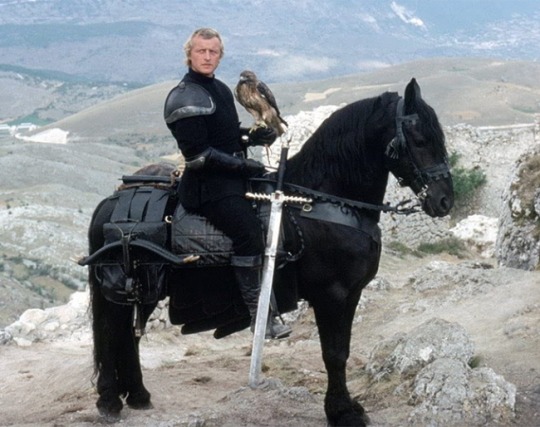
^ When thinking knight, you're probably imagining a horse like this.
Preface: When talking about fiction, there is always a question of historical accuracy. That is wholly up to you. But you will at least, after reading this, know more of the historical fact involving horses, and certainly know about some of the more commonly-complained about fallacies involving horses in media.
Now, the above still is from the film Ladyhawke (1985), which is often credited for popularizing the Friesian breed in the United States. I can almost guarantee you have see a Friesian in a film or on TV. The recent series Shadow and Bone had a central character ride a Friesian in one episode. They epitomize the romantic nobility and grace of knights. Except they don't.
The horse you see above came into existence in 1879, primarily as a harness and agricultural use horse. Horses known as Friesian horses have existed since the 11th century, but those horses were completely different from the breed created in the 19th century. The modern Friesian is a trotting breed, made to pull carriages and look beautiful doing it. They have a long back, short neck, and due to inbreeding, a host of nasty genetic problems including dwarfism, aortic rupture, hydrocephalus, and megaesophagus.
However, breeds that trace ancestry back to beyond the middle ages do exist, and they have been breed to look much the same for generations. Introducing:
The Barb/Berber Horse
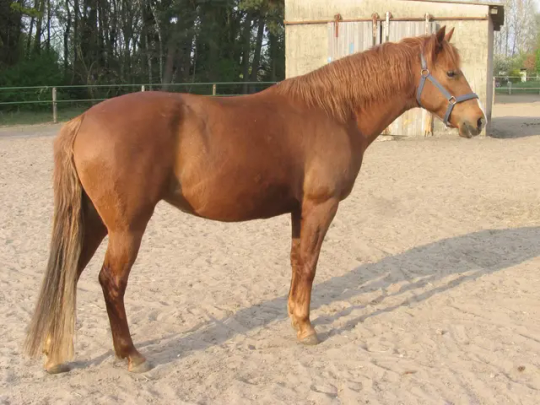
^Kinda just looks like A Horse™
The Barb comes from North Africa, and was spread into Europe through the Muslim conquest of Spain, where the breed mixed with the native Andalusian breed to create the Spanish Jennet, which is possibly the most widely successful horse breed in all of history. The Jennet is currently extinct*, but due to its durability, it was the horse used by the Spanish AND the British to invade the Americas, and descendants of the Jennet survive in local breeds from Argentina to Canada.
*a revitalization breed does exist of the same name
The Andalusian/Lusitano/Pure Raza Espanol
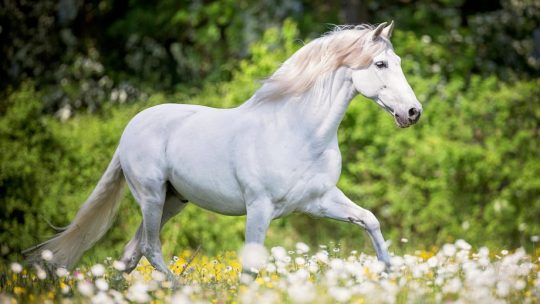
^The true Fabio of horses, known for thick flowing locks and sweet dispositions
Possibly the horse that most strongly resembles the ancient knighly horse, this noble creature used to be the preferred horse of film, before the Friesian rise in popularity. Horses of Spanish bloodlines are Andalusian, horses of Portuguese bloodlines are Lusitano, but the characteristics of both breeds are nearly identical. They are also known for a fancy 'high stepping' movement, in which they raise their knees higher than other breeds naturally.
The Arabian
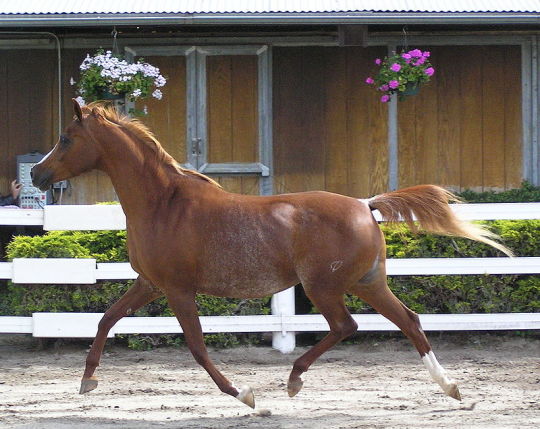
^Note the narrow, 'dished' face and raised tail, breed characteristics
The ancient horse of the desert, made famous through books such as The Black Stallion, King of the Wind, and films such as Hildago. These horses are known for their stamina and intelligence, and were traditionally used as war horses by the desert tribes of the Arabian Peninsula. The Arabian has descendants in almost all modern breeds, as it is used to add strength and stamina to the original stock, despite being a relatively small horse. During the Napoleonic wars, this horse became the prized war horse of Europe as well, with Napoleon himself preferring to ride Arabians into battle.
The Mongolian Horse
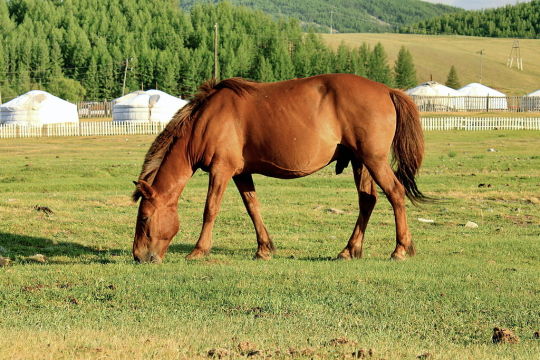
^Thick head, thick body, this horse is made to survive winter on the steppes
Introduced to Europe from the Hunnic invasions that ended the rule of Rome, the Mongolian horse is made to survive, thrive, and run in harsh cold weather. This horse allowed Ghengis Khan and his soldiers to conqure one of the largest empires to ever exist, from Korea to Poland. This compact horse would have mixed with the native stock of Russian, Eastern European, and Germanic tribes to help create the ancient northern horses, resulting in a thicker breed of horse in the north, and a lighter breed of horse in the south of Europe. Modern-day pony breeds such as the Exmoor, Fjord, Icelandic, and other have been found to have genetic ties to the Mongolian horse.
These horses do not exactly look like the modern image of knights on massive horses, but it is useful to remember that 1. people back then were a lot smaller and 2. horses back then were a lot smaller. Of course, there were hundreds of other local breeds during the middle ages, but many have been modernized and become today's sport, work, or pleasure horses.
During the middle ages, horses were not actually defined by breed. They were defined by the work the horse was suited and trained to preform. There were five main types of medieval horses.
The Destrier
Also called The Great Horse for its size, strength, and price, this horse was the renown mount of knights and kings in battle. These horses were highly trained for battle, and could be taught to do such things as striking out at soldiers in front, kicking at soldiers from the back, and even leaping all four feet in the air to protect it's rider. They would wear the most armor, and these horses would likely be closest in appearance to the modern Andalusian.
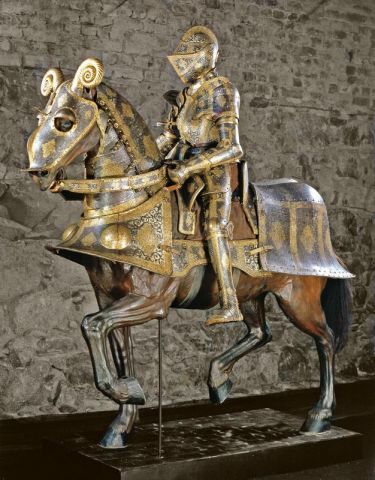
^Ornate heavy armor on a model horse. This armor was made for a horse not much more than 15hh, what today would be a small horse.
The Courser/The Charger
A lighter horse than the destrier, the courser is also a warhorse, highly trained and well-bred, but a little less expensive. A knight might not be able to afford a destrier, especially as a minor knight, but every knight should have a courser. The Spanish Jennet is the epitome of the medieval courser, and in fact was the horse used by Richard II. According to Shakespeare, the horse's name was White Surrey, although other sources claim the horse was Roan Barbary, and was a Barb or Berber horse*.
*Bought from Spain and likely a cross of Spanish and African blood, so a Jennet. But Jennet was also a classification of a horse type in those days, so, sources are muddled.
The Rouncey
The 'average' horse of the time, this horse was used mainly for riding, but could sometimes be ridden into battle if trained properly, and were the preferred horse for lower-class fighters such as archers or men-at-arms. As it described a riding horse, these horses came in all shapes and sizes, from all lineages, and in all colors. In peacetime they could be used to draw carriages or work fields. A proud and expensive destrier would never be caught pulling a plow.
The Palfrey
A highly-bred, highly trained horse, this horse is a high quality riding horse known for a specific gait, called an ambling gait. This horse had a special pattern of moving its feet that gave the rider a considerably more comfortable ride than the traditional 4 gaited horse. After the middle ages, these horses almost disappeared, only to be recovered in the Americas in the form of 'gaited' horses such as the Paso Fino, the Rocky Mountain Horse, the Missouri Foxtrotter, and the Tennessee Walking Horse. The Icelandic horse has also retained the special Tölt gait that may* be the exact gait of medieval ambling horses.
*may, I am not a gaited horse expert.
The Packhorse
This describes any kind of horse, usually a rouncey, that is used not for riding but to carry supplies. Packhorses could also be mules, donkeys, and ponies, so long as they could carry weight for long miles. These were supply horses, carrying food, weapons, tents, whatever else may be needed.
Knights, Horses, and the Battlefield
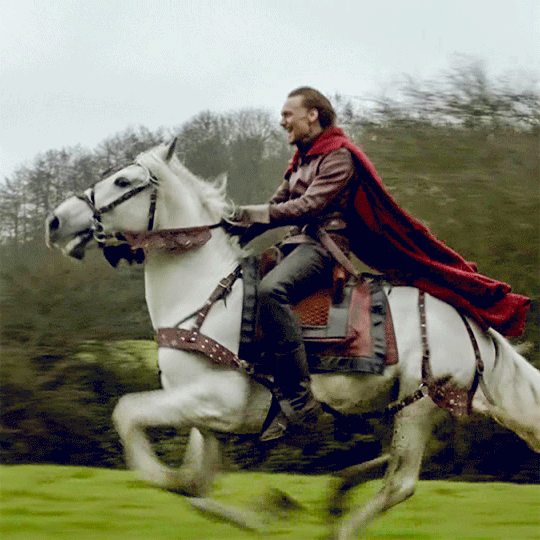
^ What an incredible creature of power and nobility. The man is fine too, I guess.
Now, if you have seen the above scene, you have probably seen The Hollow Crown, a historical drama with a few late Medieval battle scenes. In these scenes, knight clashes against knight in a furious charge, leading to pitched battles on horseback. I'm not going to say that never happened, but by and large cavalry was directed against infantry, not other cavalry, or used to conduct maneuvers requiring speed and surprise, such as a charge, a circling maneuver, a bluff retreat and most importantly, to chase down routing enemy soldiers. A knight on horseback was most effective in close quarters against unmounted and surprised soldiers. Lances were the primary weapon, allowing a mounted warrior length to spear and batter down at enemies, and a sword was secondary, as it had a shorter length, and would be used if a mounted warrior was surrounded by infantry or in battle against another knight. Throughout the medieval period, horses sometimes were removed from the fight all together due to unfavorable land, and kept in reserve to either help the army flee or to chase down the fleeing enemy.
Hungry for more?
There are many sources out there to learn more about the medieval period and knights in particular. I would highly recommend that you not look at Medieval Times sources, if only because better sources are out there. I enjoy the videos produce by Jason Kingsley CBE (Yes, that Jason Kingsley CBE) on his Modern History TV YouTube Channel, and find them to be accurate as far as I'm aware.
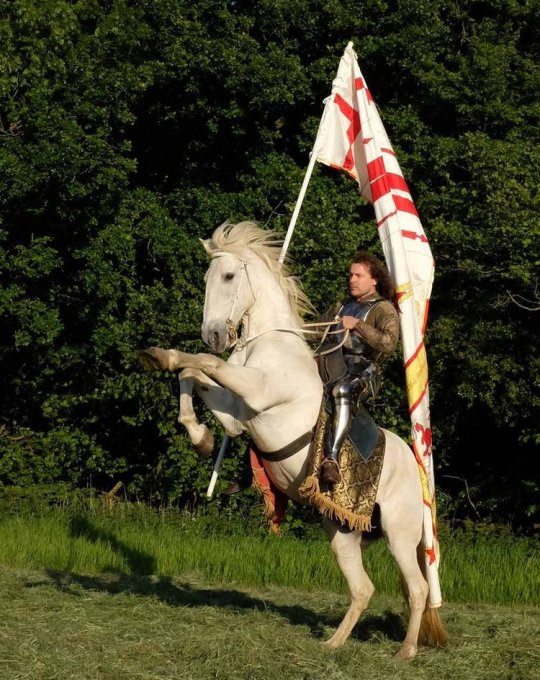
^ Jason Kingsley and his horse Warlord, in costume. I've sent marriage proposals but I've not yet received a reply.
That's all for this post. I'll have more when I feel like it, and send me questions if you want to know more about specific things or need a writing question answered
Reblogs welcome and encouraged
@jacqueswriteblrlibrary for wider reach
#writing#writeblr#writing horses#how to write horses#writer advice#writing help#writeblr community#writers on tumblr#writers#writerscommunity#creative writing#horses#how to write#advice post#medieval knights#writing medieval horses#horses in film and media#writing fiction#writer stuff#writing fantasy#writing historical fiction
225 notes
·
View notes
Text
Fantasy Guide to Political Structures

A Horse! A Horse! My X for a Horse!
Let's be honest, fantasy authors love their kingdoms and empires. You can throw a rock in a bookshop or a library in the fantasy section and you will 99.99999% hit a fantasy book that will be set in or mention either of those structures. But what are they really? What's the difference between them all? Are there any more examples of structures that would suit your WIP better? Are you using the right terms? Let's have a closer look.
Duchy

A Duchy is a small territory ruled by a Duke/Duchess. While Duchies can be found in kingdoms, some duchies were sovereign states in their own right. Duchies are usually small by land mass but some duchies such as Burgundy were extremely powerful and influential. Independent Duchies were usually apart of a kingdom but grew so powerful that they eventually broke away to become a sovereign state in their own right. An example would be modern day Luxembourg, historic Milan and Burgundy.
Principality

A principality is territory ruled by a Prince/Princess. A principality is typically smaller than a kingdom and in some instances, can be apart of a larger kingdom or be a sovereign state. Principalities have a history of having broken away from a larger kingdom or eventually becoming apart of a kingdom. A principality within a kingdom is ruled by a Prince/Princess, usually an heir of the monarch and can be used to train them up to assume the throne in the future. Examples include Monaco, Liechtenstein and Andorra.
Kingdom

A sovereign state/country that is ruled by ruling King or a Queen. A kingdom is much larger and more powerful than a principality. Kingdoms can be feudal, meaning they are ruled in a strict hierarchy or an autocracy where the monarch rules alone with minimal input from the government or constitutional where the monarch is more of a figurehead and the government has a good chunk of control. Examples include England, Thailand and modern day Spain.
Commonwealth

A Commonwealth isn't a popular choice in fantasy but it is an interesting structure. A Commonwealth in its most basic form is a collection of states that are linked by either a shared culture or history. A Commonwealth can be a politically power or an economic power, with every state allowed to participate as much as they like. Not one state leads the others, it is all one group of equals. A Commonwealth can be a good idea for a group of nations that are more powerful together with them keeping their own independence.
Federation

A Federation is a political structure that is made up of united states or countries that are under a single government but each state is still independent and rules itself. Each state can have different laws, different cultures and economies but they all answer to the single government. Examples include the United States of America.
Republic

A Republic is a territory that is ruled by leaders and heads of state that have been elected on merit and by choice of the people. Republics are not just countries but can also be much smaller areas such as cities. Republics are democratic in nature, with the people having a say in who leads them in accordance to a constitution. There are many kinds of Republic: presidential, parliamentary, federal, theocratic, unitary. Examples of Republics include the Republic of Ireland and the city of Florence.
Protectorate

A Protectorate is a country/region/territory that is independent but relies on a larger, more powerful state for protection either in a military or diplomatic sense. A Protectorate was often used by Empires in order to maintain control over an area without annexing it. There are many reasons a larger state and the protectorate would agree to this, mainly the protectorate is much smaller meaning it is far more vulnerable to attack or it has very little power when compared to other states. A Protectorate allows the territory some power to rule itself but the larger state may feel the need or desire to interfere in the dealings of the territory. Examples of protectorates include the client kingdoms of the Roman Empire like Egypt before its annexation and Puerto Rico.
Empire

An Empire is a collection of nations that are united under one sovereign head of state or government. An Empire is formed by one nation steadily taking control of other nations, either through straight invasion and colonization or acquiring them through marriage and other less violent ways. An Empire is powerful mainly because it can drum up more resources, more influence and more military power. An Empire might impose the traditions, beliefs and culture of its principal nation - the nation that started it all - onto its colonies for better control and feeling of uniformity. Empires never last, that is something to always remember. Empires will eventually fragment due to the vast size and sometimes revolt among the conquered states. Examples of empires include the Roman Empire, the Byzantine Empire, the Ottoman Empire.
#fantasy guide to political structures#kingdoms#empires#writeblr#writing reference#writing resources#writing#writing advice#writer#writer's problems#spilled words#writer's life#fantasy guide#creative writing#writing fantasy#writing community#writing inspiration#writing prompt#writing problems#on writing#writers#writing help#writing tips#wtwcommunity#writing guide
5K notes
·
View notes
Text
Creating fantasy religions: something I'm doing now so thought I would post about my process.
The mistake a lot of writers make is developing a religion from a singular event, and piling a ton of stuff on top of it that makes logical sense. Whereas, in reality, religions are self propelling systems that travel under their own steam and if there is an event that catalyses them, it is never in a socio-cultural or political and economic vacuum.
You also end up with an apparently totally random set of things attached to one figure which does make sense if you know the origins, but otherwise is just accepted even if the meaning is lost.
It is the difference between "the god of Midwinter and festivals around this originated because a cult of necromancers were banished into the frozen wastes and this <event> became the Origin Story for how we got to a midwinter festival with creepy bone puppets in my fantasy world" and a religion that feels ... Real.
Ok so firstly, this is a bit too neat. (This was my original reasoning for a midwinter god called Yarash and I changed it because it wasn't very realistic or interesting for my world.)
Why, let's say, is the god whose feast is at midwinter also the patron of puppet makers and osteopaths?
Well, we could say that this makes a lot of sense because the god's festival was originally to do with remembering the dead, and puppets were used in the festival to represent the dead, as necromancy should have been part of it but people didn't actually know how to raise the dead properly. Then as magic evolved people could actually raise the dead for short periods to deliver messages in these festivals, but this drew internal debate from the conservative priests who thought puppets were the original form and so should be maintained, and necromancy was an aberration, vs the progressives who saw necromancy as the original INTENTION and so the natural and correct progression from the puppets. The debate might rage on for years creating splinters, sects, differing traditions that sit uneasily together but find middle ground in other less controversial topics and practices, and even cults.
At some point, the secular authorities get involved for their own reasons. Maybe some rulers are pro-"The Old Bones" or anti-, or they want to outlaw necromancy or benefit from it for various political reasons, socio-cultural reasons, economic reasons, military intelligence reasons, etc. Whatever happens, happens. Times change. Official attitudes swing back and forth, while internally the religious debates continue, now informed by and perhaps as counters to, this secular intervention.
Then we end up in modern times, the times of the story. Nobody really believes in gods anymore. They do remember the old gods of the seasons and at the secular festival in winter, there are a lot of traditional puppet shows that have a whole history and life of their own. The puppets are called "the old bones" and nobody really remembers why. Osteopaths have the puppets and symbols relating to the midwinter festival on their certificates and college heraldry and nobody really remembers why, but the information is there to look up and is a fun thing to know for trivia nights.
And necromancy... is a controversial branch of science, divorced from its original religious significance for many but not for all, and more integrated as an art or practice in the public consciousness (positively or negatively depending on perspective and propaganda and actual usage).
And now, you have a ton of depth and meat to it without having to flesh out the arguments and debates themselves unless that is plot relevant.
There is a lot you can do with this society now, and by tweaking one thing you can create completely different societies and ideologies. The depth is now there to set your story at any point during this history and to develop numerous ideas. So much stuff can happen.
With the singular event version, and a static fact of a necromancy cult in the frozen wastes, things are much more limited and linear, with less depth to play with.
Also remember that your characters will not be expected to know everything about your world unless they are experts in religion and/or history, and also the 2 subjects are not mutually inclusive so a historian is not an expert theologian and vice versa. How much the average person on the street knows depends on levels of formal education, accessible knowledge beyond formal education, which may include religious instruction and folklore, and propaganda. But it means you can build in some subtle things - like the puppet symbols on the door of an osteopath or bone doctor - that never need to be explained, but have a logical in-world explanation below the surface.
Try taking a static idea and work it into a system and see where it leads!
EDIT: I'm doing a workshop on Build A Hellscape at the Devils and Justified Sinners online conference, Saturday 24th Aug 2024, 9AM UK Time. Sign up below:
#writeblr#worldbuilding#fantasy religion#writers on tumblr#writing community#writing tips#world building#writing fantasy#fantasy#fantasy writing
384 notes
·
View notes
Text
“How interesting. A priest who blasphemes his god.”
“Of course I bloody do! What’s ‘e gonna do? Smite me? I’m ’is only bloody follower!”
- unnamed old man cleric character who just popped into my head and won’t go away.
5K notes
·
View notes
Text
Insults (Fantasy Edition)
They're as useful as a wet blanket in the middle of winter
I could talk to my horse and have a better conversation
She did love her family, but she'd rather have an ocean between her and them.
He was the kind of man to stumble across rational thought quite by accident and dismiss it as absurd
'Quite frankly, I'd rather eat Hemlock.'
I know the gods do not exist, because if they did, they would've struck you down by now.
Well, you're clearly got some troll ancestry.
That's probably the wisest thing you've ever said and yet still you are wrong.
Do you just sit there all day and hope some sort of sentient through floats in your direction
She was tolerable. From a distance.
They were often wrong but never in doubt.
#writing#writing prompt#writing prompts#creative writing#writeblr community#fantasy prompts#prompt#writeblr#hero x villain#prompts#story prompts#fantasy worldbuilding#fantasy#writing fantasy#fantasy insults
4K notes
·
View notes
Text
How many writing projects do you have?
(If anything, I don't just mean ideas, I mean full-blown projects-when you already have a plot, have characters, and just need to finalize the details and write the whole thing.)
I'll go first. I have 22 projects at the moment, one of which I'm very actively working on.
#writer#writers on tumblr#writerscommunity#writing#books#books and reading#creative writing#my writing#writer things#writers life#writers on writing#writers block#writer stuff#writers stuff#writers#writings#writing blog#writing books#writing block#writing stuff#writing fantasy#fantasy writing#fantasy writer#creative writers#writers community#writing community#writer community
201 notes
·
View notes
Text
me doing anything else: omggg i just wanna write i could making so much progress on my WIP right nowww
me working on said WIP: scrolling on phone with laptop open on the same chapter it's been open on for days.
#a tragic cycle#novel#novel writing#writeblr#fantasy#books#my writing#wip#writing#writers block#writing motivation#writer stuff#writers on writing#writers#writer#writers on tumblr#writerscommunity#writers and poets#female writers#writing community#writing life#writing stuff#on writing#creative writing#writing fantasy#writing fiction#fantasy writer#procrastination#i'm procrastinating#thewordsarestuckinmyhead
168 notes
·
View notes
Text
Guys I. I wrote the book you've always known was coming... HOW TO WRITE A FANTASY BATTLE: BASIC MEDIEVAL AND MODERN MILITARY TACTICS FOR AUTHORS

The forces of good are arrayed against the minions of evil on a storm-swept battlefield, and someone is about to yell “Charge!”—Now what?
We’ve all been there. Many fantasy novels end with a climactic battle scene, yet few authors have a solid understanding of how battles are planned, staged, fought, and won. The answers are locked within dense history books—but never fear: I read them so you don’t have to.
This short, accessible book not only gives you a crash course on basic military strategy and tactics across history—it also contains invaluable tips on how to adapt real-world battle tactics into a thrilling scene for your fantasy novel. Along the way you’ll learn:
How socio-economic forces affect the ways that battles are fought.
The importance of factors such as surprise, terrain, fog of war, and more.
Different categories of fighters.
How your world-building and magic system may affect your battle.
The typical phases a battle may go through.
Where to find more advanced resources.
This book contains countless examples from real and fictional battles, collected during the ten years I’ve spent reading up on medieval and modern military history—and put into terms which anyone can understand.
Read How to Write a Fantasy Battle, and tackle that battle scene with confidence! Pre-order live now at Amazon, coming to all retailer platforms 11 July, 2025.
#my books#military tactics#medieval history#writing tip#writing advice#writing fantasy#historical accuracy#suzannah rowntree#medieval fantasy
119 notes
·
View notes
Text
If you think you're going a little far in torturing your character, you're probably doing just fine. Remember, a character at the very brink of madness is a happy character.
#writing#writing advice#creative writing#writers#writer#writeblr#writers on tumblr#authors on tumblr#authors#ao3 author#ao3#fanfic#ao3 fanfic#ao3 fanfiction#fanfic writing#authors of tumblr#indie author#writing woes#writing things#writing tips#writing tag#writing thoughts#writing books#writing community#writing discussion#writing encouragement#writing fantasy#writing goals#writing help#writing inspiration
92 notes
·
View notes
Text
Why would I need plagiarism software to brainstorm ideas if I already have:
💻Daydreaming during work💻
💤Insomnia💤
✨The Shower✨
AND
Info-dumping my poor mom like

#writers on tumblr#writeblr#writing#creative writing#writing memes#writer problems#am writing#writing fantasy#memes#ai is stupid
341 notes
·
View notes
Text
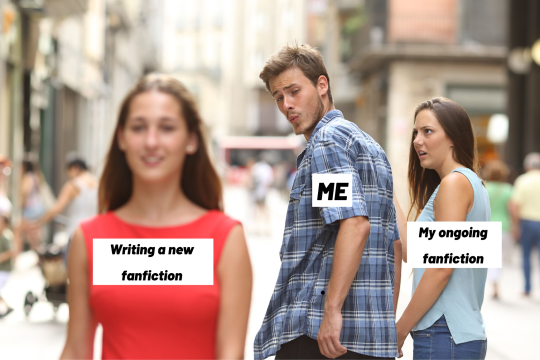
Life is hard.
#fanfiction#writing fanfic#I got this Fantasy!Zosan AU I want to write about#but I haven't had time to work on my main fanfic#i don't know what to do#Zosan au#zosan idea#sanzo#zosan fanfic#zosan fanfictiom#one piece#zosan#op#yaoi#shipping#fandom#fluff#sanji x zoro#anime#ao3#ao3 writer#ao3 fanfic#op fanfic#one piece fanfic#destiel fanfic#destiel fanfiction#spn#supernatural#supernatural fanfiction#writing fantasy
66 notes
·
View notes
Text
The 3-Scene Rule to Instantly Level Up Your Plot
Plotting your story but feel like it’s dragging its feet? Don’t sweat it! The 3-Scene Rule is here to save the day—and cut down those long hours of painful brainstorming. Think of these scenes as the ultimate power trio:
1. The Catalyst:
Boom! This is the moment where everything changes. Your characters' boring old lives? Gone. Welcome chaos, adventure, or a problem too juicy to ignore. Let this scene kick off your story with a bang. Ease your readers in with a compelling premise rooted in the main character's life. While keeping some secrets to unfold later, make every breadcrumb just as intriguing as the big reveal to come. Nail this, and your readers will be hooked.
2. The Turning Point:
Uh-oh, didn’t see that coming! That’s the exact goal here. This is where things get spicy—big choices, shocking revelations, or a shift that turns everything upside down. In every turning point, something must change. Whether it’s for better or worse is up to you. Just make sure the tension’s through the roof and the stakes even higher.
3. The Climax:
This is it—the grand finale, the fireworks, the big “OMG!” moment. It’s time to bring out all the juicy drama you’ve been saving. Tie up loose ends, connect every dot, and deliver the answers your readers have been dying for. Make it unforgettable with action, emotion, and twists that pack a punch.
There you have it! These three scenes will supercharge your plot, keeping readers glued to every page. So, what’s stopping you? Go on—start plotting, and own that story!
💜💜💜
Ready to make your story a masterpiece? Say hello to The Ultimate Plot Progression Printable Planner—your best mate for nailing those Catalyst, Turning Point, and Climax moments like a pro!
Packed with tools, tips, and tricks, it’s the cheat code you’ve been waiting for to keep your plot tighter than ever. Oh, and as a little bonus treat, grab your FREE exclusive prompt gift (featuring 40 different prompt ideas to create compelling plot scenes) when you snag the planner. Don’t wait—your next brilliant story is just a click away!
#writeblr#writers on tumblr#writing#writers and poets#writing community#writer#writerscommunity#ao3 writer#wattpad#a03 writer#creative writing#writers block#writers#writing advice#on writing#writing a book#writing and poetry#writing guide#writing goals#writing reference#writing resources#writing characters#plot#plot problems#plot post#plotting#plot development#fiction writing#writing fiction#writing fantasy
80 notes
·
View notes
Text
Writing Mermaids

A list of resources on how to write mermaids, since I enjoy writing stories about mermaids.
How to Write Mermaids Provides tips and suggestions for creating a mermaid’s physical appearance, culture, and magical abilities. Provides suggestions for creating a mermaid’s motivations and conflicts in relation to their world and the human world.
Guide to Mermaids Provides tips and suggestions for designing a mermaid’s tail, describing a mermaid’s swimming abilities, choosing where a mermaid lives, and creating a mermaid’s civilization or culture. Many of the links provided do not work, but the post itself contains helpful information.
Writing Notes: Mermaids & Sirens Provides interesting information on mermaids and sirens, along with examples.
Wikipedia: Mermaid The Wikipedia entry on mermaids. Provides a starting place of information on mermaids, including their history and origins, myths and folklore from different parts of the world, and examples from literature and other popular media.
TV Tropes: Our Mermaids Are Different A TV Tropes entry on mermaids. Includes several examples of mermaids featured in different types of popular media.
TV Tropes: Mer Tropes A TV Tropes entry that provides a list of the different tropes about merfolk.
Fandom Wiki: Mermaids The Fandom Wiki entry on the mermaids featured in the Pirates of the Caribbean films.
Becoming Mermaids An article that explains the history and origins of mermaids, with examples of different types of mermaids in myths and folklore from around the world. From the American Museum of Natural History website.
Fantastically Wrong: The Murderous, Sometimes Sexy History of the Mermaid An article that explains the history and origins of mermaids, with references from books.
8 Fun Facts About Mermaids A blog post with a list of interesting facts about mermaids. Many of the links provided do not work, but the post itself contains interesting information.
The Anatomy of a Mermaid A detailed discussion on the anatomy of a mermaid. Includes images.
Different Kinds of Mermaids A list of ideas for different types of mermaids.
Goodreads: Mermaid Books The Goodreads page with lists of books featuring mermaids.
Goodreads: YA Mermaid Books A Goodreads list of young adult books that feature mermaids.
19 Mermaid Movies to Watch to Feel like a Little Mermaid A list of mermaid-themed movies from Teen Vogue.
I recommend using these resources as a way to brainstorm your own ideas, or as a starting point for research (i.e., researching things like marine species, the ocean, or folklore and legends). It’s always a good idea to continue your research by checking reputable sources! However, these resources can be used for inspiration or to give you an idea of where to start in your own research.
If you’re stuck on what to name your mermaid characters, you can check out the resources I shared in Names for Mermaids & Mermen.
+
I’m a writer, poet, and editor. I share writing resources that I’ve collected over the years and found helpful for my own writing. If you like my blog, follow me for more resources to help with your writing process! ♡
58 notes
·
View notes